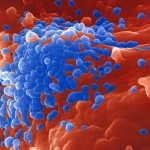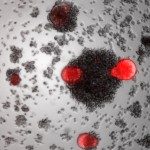Lien vers Pubmed [PMID] – 18515351
Nucleic Acids Res. 2008 Jul;36(12):e72
DNA complementarity is expressed by way of three hydrogen bonds for a G:C base pair and two for A:T. As a result, careful control of the denaturation temperature of PCR allows selective amplification of AT-rich alleles. Yet for the same reason, the converse is not possible, selective amplification of GC-rich alleles. Inosine (I) hydrogen bonds to cytosine by two hydrogen bonds while diaminopurine (D) forms three hydrogen bonds with thymine. By substituting dATP by dDTP and dGTP by dITP in a PCR reaction, DNA is obtained in which the natural hydrogen bonding rule is inversed. When PCR is performed at limiting denaturation temperatures, it is possible to recover GC-rich viral genomes and inverted Alu elements embedded in cellular mRNAs resulting from editing by dsRNA dependent host cell adenosine deaminases. The editing of Alu elements in cellular mRNAs was strongly enhanced by type I interferon induction indicating a novel link mRNA metabolism and innate immunity.




